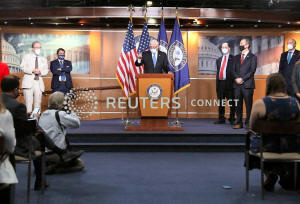Bolton, Democrats urge Russia sanctions if bounty reports are true
 Send a link to a friend
Send a link to a friend
 [July 01, 2020]
By Patricia Zengerle, Mark Hosenball and Steve Holland [July 01, 2020]
By Patricia Zengerle, Mark Hosenball and Steve Holland
WASHINGTON (Reuters) - Democrats and a leading Republican hawk on
Tuesday called for U.S. President Donald Trump to consider imposing new
economic sanctions on Russia if a reported Russian effort to pay the
Taliban to kill U.S. soldiers in Afghanistan was confirmed.
Trump has been under pressure over a New York Times report on Friday
that a Russian military intelligence unit had offered bounties for U.S.
and allied soldiers and later reported that he received a written
briefing on the matter in February.
After Trump initially said he was not briefed on the matter, the White
House said Trump was not "personally" briefed but did not address
whether he had received a written report, read it, and why he had not
responded more aggressively if so.
"The President was never briefed on this, this intelligence still has
not been verified, and there is no consensus among the intelligence
community," White House spokeswoman Kayleigh McEnany told reporters.
The shifting statements have generated controversy among Trump's fellow
Republicans as well as Democrats as he seeks re-election on Nov. 3.
House of Representatives Intelligence Committee Chairman Adam Schiff, a
Democrat, said Trump should take action against Moscow.

"We should be considering what sanctions are appropriate to further
deter Russia's malign activities," he told reporters after a briefing
for House Democrats at the White House.
Democratic presidential candidate Joe Biden called Trump's handling of
the matter a "dereliction of duty."
And Republican hawk John Bolton, Trump's former national security
adviser, told Reuters if the allegations were true it was "tantamount to
an attack on Americans directly."
"That requires a very serious response," he said. "It could well be
asymmetric economic sanctions.
The White House has sought to play down reports in the Times and the
Washington Post that it knew of accusations that Russia paid the Taliban
bounties to kill U.S. and coalition troops but had not briefed Trump or
acted on the information.
Four U.S. government sources have confirmed to Reuters that credible
U.S. intelligence suggested Russia offered such bounties.
[to top of second column]
|

U.S. House Majority Leader Steny Hoyer (D-MD) speaks to reporters as
House Democrats respond to a White House briefing on reports Russia
paid the Taliban bounties to kill U.S. troops during a news
conference following the briefing at the U.S. Capitol in Washington,
U.S., June 30, 2020. REUTERS/Jonathan Ernst

A fifth person familiar with the matter said such intelligence was
first brought to the White House's attention around March 2019 but
it was then uncorroborated and "could have been disinformation."
The New York Times cited two unnamed officials as saying officials
gave Trump a written briefing in late February laying out their
conclusion that Russia had paid bounties.
The newspaper said it was in the President’s Daily Brief (PDB)
document - the premier product of U.S. intelligence agencies that is
prepared for him to read.
A U.S. government source told Reuters material is sometimes included
in PDBs so that other officials can evaluate it.
In this case, the source said that the matter was raised at a high
level earlier this year, the intelligence is regarded as credible,
and steps were taken to formulate a response.
The source suggested a response was still under discussion and Trump
arguably did not have to be involved while the information was
checked out.
However, a congressional source voiced skepticism that such
information would be included in a PDB with an expectation the
president would not read it and that others would deal with it.
On Tuesday, the New York Times reported that U.S. officials had
intercepted data showing big financial transfers from an account
controlled by Russia’s military intelligence agency to a
Taliban-linked account. It said this eased disagreements in the U.S.
intelligence community and undercut White House officials’ claim
that the intelligence was too uncertain to brief Trump.

(Reporting by Patricia Zengerle and Mark Hosenball in Washington;
Additional reporting by Diane Bartz, Tim Ahmann, Idrees Ali, Susan
Heavey, Lisa Lambert, Phil Stewart and Jonathan Landay; Writing by
Arshad Mohammed, Andy Sullivan and Susan Heavey; Editing by Steve
Orlofsky, Howard Goller and Grant McCool)
[© 2020 Thomson Reuters. All rights
reserved.] Copyright 2020 Reuters. All rights reserved. This material may not be published,
broadcast, rewritten or redistributed.
Thompson Reuters is solely responsible for this content. |